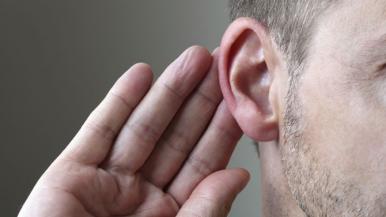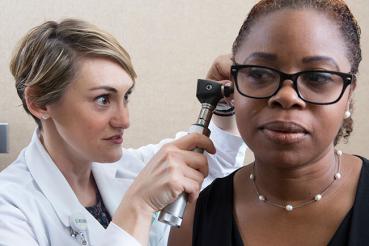Even though chronic hearing loss is one of the most prevalent chronic conditions for people 65 and older, less than 20 percent seek help for it, says Michael Hefferly, PhD, an audiologist at Rush.
One reason: lack of awareness. "There's a misconception that hearing loss means you need a hearing aid," Hefferly says. And not everyone feels ready to get a hearing aid the moment they notice a problem.
But ignoring the problem can lead to disengagement from conversations and activities, which can dramatically affect your quality of life, he says. It can also seriously affect your health, increasing your risk of the following:
- Depression
- Dementia
- Longer stays when you go to the hospital
- Increased health care costs
If you or a loved one experiences signs of hearing loss (see below), now is the time to talk with an audiologist.
Primary care physicians can help arrange appointments for comprehensive hearing evaluations with audiologists.
Audiologists assess the degree to which hearing loss is causing hearing problems and how these problems affect overall function and quality of life. Because communication is a shared activity, audiologists also assess how hearing problems impact family and friends.
Strategies for success
To improve your ability to hear important speech sounds, your audiologist may recommend amplification through the use of a hearing aid or an assistive listening device (e.g., TV and phone amplifiers), or both.
However, it is important to recognize that the right solution depends not just on your hearing loss but on your unique set of communication needs. With your care team and loved ones, you might decide that you want amplification most of the time or only some of the time (for example, if you don't eat out, then technology to improve hearing at restaurants is not necessary). Or, you and your loved ones may find that better listening strategies are enough.
How to listen better after hearing loss
"Listening is what you're really trying to do," Hefferly says. "And sound is just one of several tools we use to listen." The others include facial expressions, lip movements, gestures and contextual knowledge.
Although the use of a hearing aid or an assistive listening device can be an important step toward improving hearing, it's not the only change that can make a difference.
Hefferly offers the following advice to help listeners gain a better understanding of speech:
- Try to understand the context of the conversation, not every word or sound.
- Watch the speaker's lips, facial expressions and gestures while they speak.
- Position yourself to get a full view of the face, not just the profile, so you can see the speaker's lips and facial expressions. Nonverbal cues can be helpful.
- Consider formal lip-reading instruction.
- Ensure that your vision is adequate — with or without glasses.
- Use a quiet room to talk. Reduce background noise by turning off the television or turning it down, closing a door or window, etc.
- In public places, ask for any assistive listening devices that might be available. Movie theaters and playhouses often have devices that will amplify the performers' voices.
- Explain your needs. Describe to others what helps you best to understand.
- Be honest when you don't understand. If you only pretend to understand, speakers may think you are not interested in what they are saying.
- If possible, choose round tables in restaurants, meetings or other group settings. They offer the best view of the whole group.
- Avoid important conversations and complicated topics when you’re fatigued or stressed, which can make listening more difficult.
- Before meetings or events, familiarize yourself with the agenda; this will make it easier to pick up on contextual clues.
How to communicate better with people who have hearing loss
Hefferly also offers the following advice for speakers on how to communicate more effectively with, and be more sensitive toward, people who have hearing loss:
- Speak a little more slowly, but don't drag out your words or over emphasize your mouth movements. It is better to speak at a normal rate, but take short pauses between sentences and phrases. You'll be amazed at how well this works!
- Face listeners, get their attention and do not hide your mouth with your hand or any other object.
- Realize that beards and moustaches can interfere with the ease of lipreading.
- Pay attention to the listeners for cues that they do not understand what you are saying.
- Be patient with listeners; realize that they are exerting a lot of energy and concentration.
- A good listener is interpreting gestures as meaningful, so avoid gestures that aren't relevant to the content of conversation or that distract listeners from reading lips and looking at facial cues.
- In a group setting, take turns speaking; avoid interrupting others.
- Announce the topic of conversation and indicate when a new topic is introduced.
- Ask listeners if your communication with them can be made clearer in any way.
It is important to recognize that the most appropriate type of hearing aid or assistive device is not just determined by your hearing loss but by your unique set of communication needs.
If a loved one doesn't want to get help
If you think your loved one might need help for hearing loss, it's tempting to tell them to get a hearing aid. Hefferly recommends focusing, instead, on changes you may have noticed in their quality of life.
Try something like, "You know, Dad, yesterday we were having a conversation about a topic I know you love, but you weren't really in the conversation. The hearing seems to be making it more difficult. Wouldn't it be nice if you could participate more?"
You could also point out, gently, that their withdrawal from activities might be affecting others. Maybe their spouse misses activities the two of them used to do together.
Signs of hearing loss
Signs of hearing loss may include one or more of the following:
- Hearing muffled or muted speech
- Difficulty understanding conversations when in noisy spaces, such as restaurants
- Having tinnitus, a constant or sporadic sound in one or both ears, such as ringing, buzzing, roaring or hissing
- Feeling of pressure in one or both ears
- Needing to turn the volume up high on the TV or other devices
- Avoiding activities you used to enjoy because of difficulty hearing
- Feeling that people are mumbling all the time, even when they say they're not
These are signs of hearing loss in children:
- Speech is unclear or delayed
- Does not follow directions accurately
- Frequently appears to not be paying attention when spoken to
- Often says, "What?" or "Huh?"
- Watches TV with the volume up high




